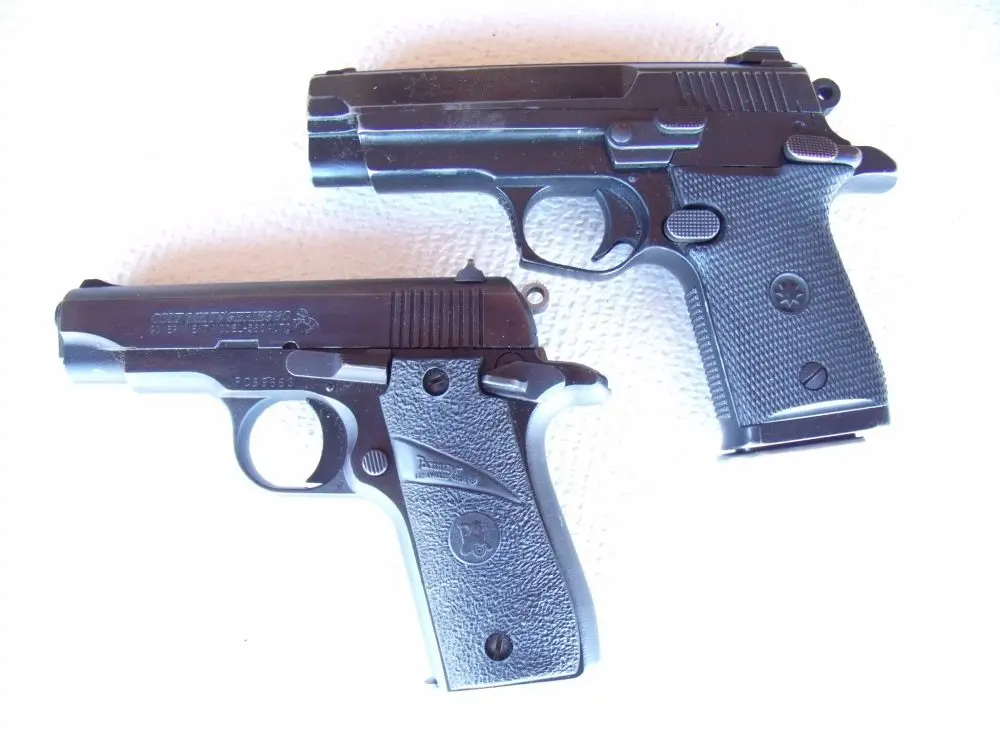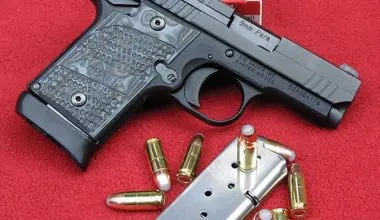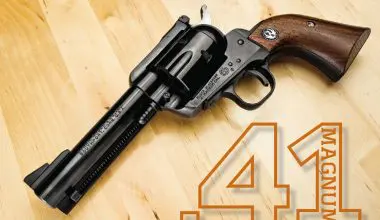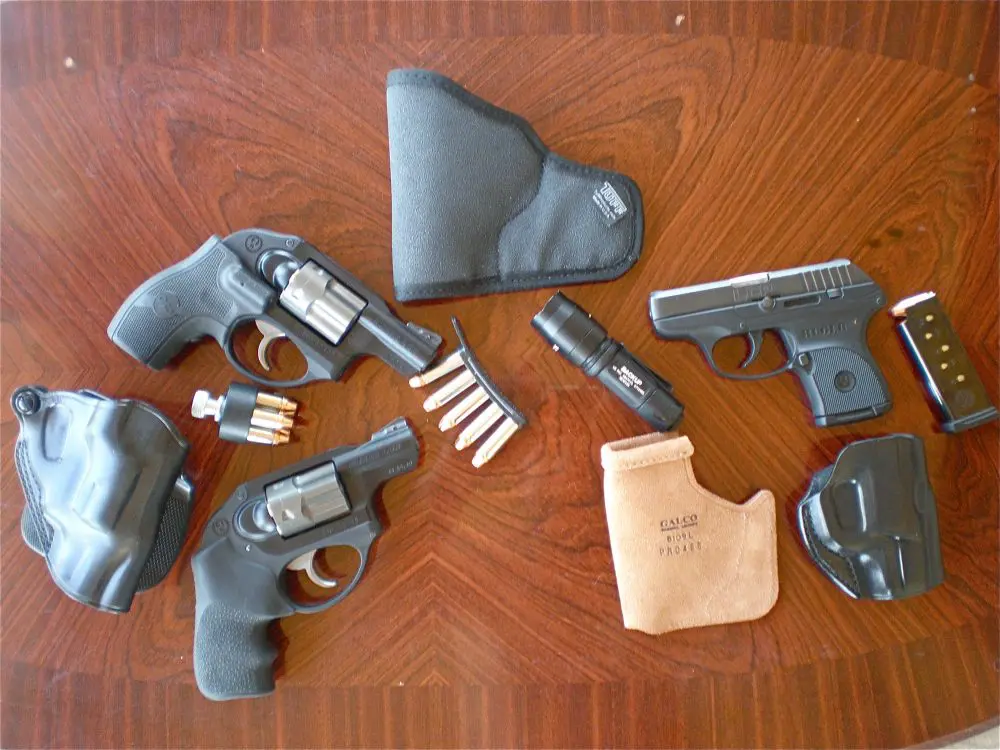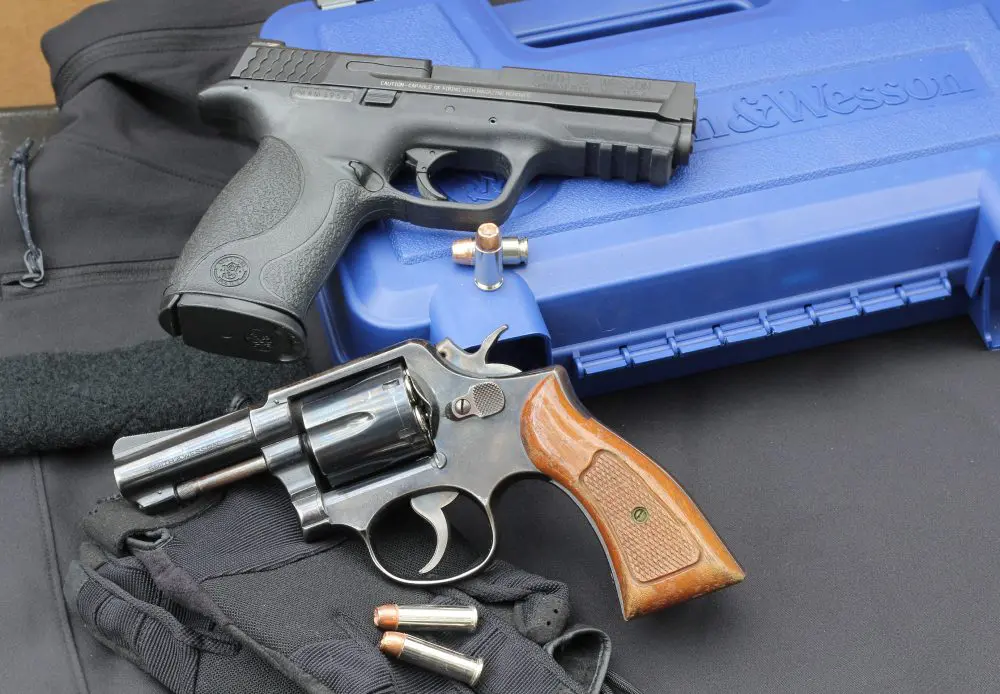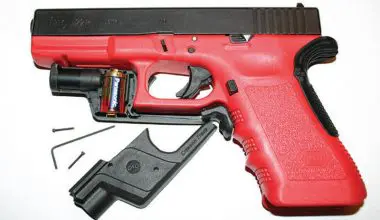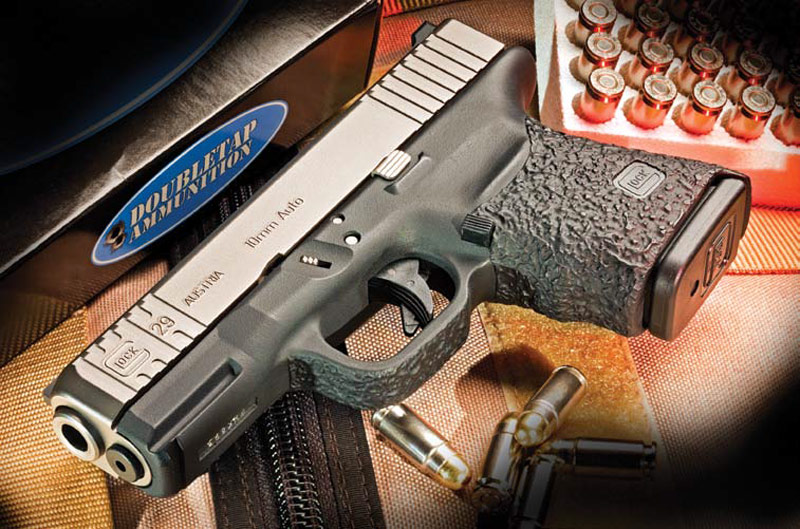
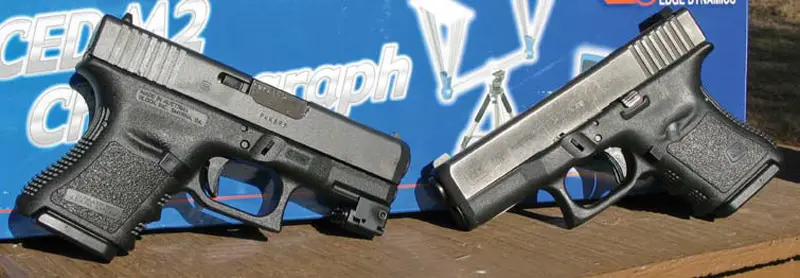
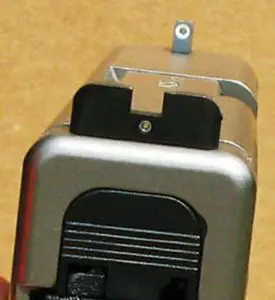
The ten is a heck of a round and in its more robust renditions serves as an excellent handgun hunting cartridge.
Its law enforcement potential was cut short by the FBI’s faulty launching system. I never had a problem with my issue pistol, but the round’s counter crime demise was sealed with the announcement of the .40 S&W cartridge that duplicated the ballistics of the FBI’s down loaded 180-grain.
Table of Contents
FBI GLOCK PHOBIA
As a part-time contrarian, I was always a Glock enthusiast and, in spite of early Bureau condemnation, I was armed with one when seconded to DEA’s tactical unit under the leadership of legendary DEA agent Frank White. The Firearms Training Unit was uncomfortable with the pistol and considered it unsafe without any redundant active safeties to manipulate. It took several years of observation of DEA’s Glock success before Gaston’s gun was finally approved for FBI agent use.
While the 10mm saga was developing, the FBI’s Hostage Rescue Team (HRT) contemplated replacing their well-worn Browning Hi-Powers with the 1911, but instead of .45 ACP, it was going to be in 10mm. A number of custom pistols were acquired for test and evaluation (T&E), with some retailing for $2,000 to $3,000. One afternoon, we were putting these beauties through their accuracy paces at 50 yards and I happened to have a 10mm Glock 20 with me. After launching 15 180-grain jacketed hollow points (JHP) from prone, we checked targets and the G20 had produced a tighter group than the 1911s that cost five times as much. This gratifying experience prompted me to immediately send Glock a check for the pistol. Now it’s a couple of decades later and I still have this brute.
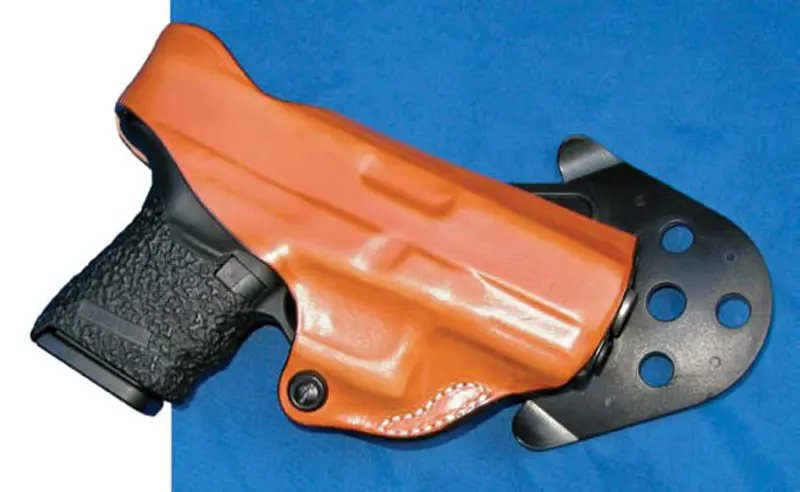
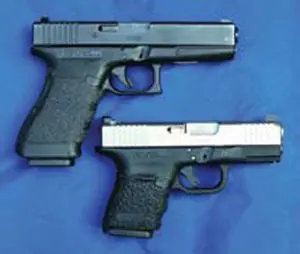
GEN 3 Glock 29
More recently, my nostalgia and interest were piqued by the excellent performance of some 10mm loads currently on the market. This further motivated me to arrange to test and evaluate the newer Generation Three Slim Frame Glock 29 pistol. (At this juncture, the Glock 29 does not come in a Gen 4 version.)
Although beauty always resides in the eye of the beholder, even in its latest manifestation, the Gen 3 gun is not what most shooters would consider “attractive.” Even though they have become shooting icons in record time, Glocks are no-nonsense, all-business pieces and reflect a bland practicality that is universally valued.
The Glock 29 comes in a lockable plastic case with an additional ten-round magazine, cleaning brushes and manual. Normally, it takes a couple hundred rounds to break in a pistol and declare it ready for street carry, but in my experience, Glocks are generally good to go right out of the box. This gun proved to be no exception, and it gobbled up all sorts of 10mm that I had collected over the years.
MULTI-CALIBER GUNS MAKE SENSE
However, just running several brands of 10mm through the gun was not going to be enough for me. I also wanted to include the ten’s other cartridge iteration, the 9x25mm Dillon—a 10mm case necked down to 9mm.
To make things even more interesting, I contacted friend and highly regarded firearms entrepreneur Robbie Barrkman of The Robar Companies and he graciously agreed to perform his custom magic on the compact blaster and transform it into a unique looking and functioning firearm.
Robar further collaborated with KKM Precision, Inc., and they kindly provided a custom barrel in the hot 9x25mm Dillon caliber to create a more versatile handgun. Of course, you can go even further with the 10mm base for more multi-caliber additions, and .40 S&W and .357 SIG will round it out to a quartet of calibers from one gun. In today’s world of potential chaos around the next corner, multi-caliber-capable guns make a lot of sense.
WARREN TACTICAL SIGHTS
Also coming on board was former FBI agent, champion competitor and Hostage Rescue Team member Scott Warren. He provided a set of his superb Warren/Sevigny two-dot tritium sights for the project. Sight radius was thusly increased by .25-inch.
9X25MM DILLON
In 1987, Dillon Precision necked down the 10mm case to 9mm in an effort to achieve sufficient velocity to qualify for the USPSA/IPSC major power factor of 175.
The round exhibited numerous positives and seemed to solve many of the problems associated with the .38 Super in competition. However, it could be physically punishing to shoot, and its shockwave would wash over one’s face while sending a very palpable impulse up the arm. Some shooters experienced arm soreness and wrist tendonitis, and guns began breaking at a much higher rate than they did with .38 Super.
However, what doomed the caliber to little more than an interesting sidebar in combat pistol competition was IPSC’s lowering the power factor to 165. Now the .38 Super could make major with greatly reduced internal pressures. Nevertheless, this caliber is a real sizzler and, with a 90-grain bullet, can reach velocities approaching 2,000 flat shooting feet-per-second (fps) when launched from a six-inch barrel.
During the customizing interim, I was able to easily defeat aluminum vehicle armor plate with 90-, 115- and 125-grain loadings fired from a six-inch Lone Wolf barrel. However, in the G29’s 3.78-inch tube, 95-grain velocities dropped to a high of 1,718 fps, but still had enough juice to penetrate the armor. However, you are relatively safe from the Glock 29 wearing Level II body armor. Both the 95- and 125-grain FMJ failed to perforate the Kevlar.
Double Tap (DT) is the only act in town when it comes to commercial ammunition in 9x25mm. This innovative outfit has a prolific ammunition menu and provides the 9x25mm consumer with eight choices in that caliber, with bullet weights spanning 80 to 147 grains.
DOUBLE TAP AND BUFFALO BORE 10MM AMMUNITION
Although several major ammunition houses still load the 10mm, semi-custom shops like DT and Buffalo Bore (BB) are the go-to companies for a variety of high-performance loads suitable for personal defense and hunting. BB fields its “Heavy 10mm” in 180-, 200- and 220-grain weights, while DT offers 13 different versions with weights ranging from 125 to 230 grains.
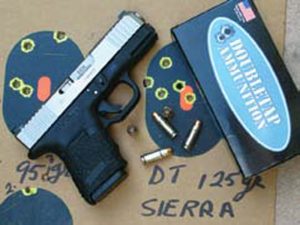
It is important to find out what your defensive firearm likes and where it prints with fixed sights. Two of my favorite commercial 10mm 135-grain loads were all over the target and would not group with this gun or the larger Glock 20. What works well in one type of firearm may not cut it in another.
KKM PRECISION
I periodically shoot with former Naval Special Warfare personnel who provide combat-zone security for intelligence agents and, to a man, their pistols have been upgraded with fully supported KKM barrels that can safely shoot lead as well as jacketed bullets.
KKM’s drop-in or gunsmith-fit barrels are made from 416 stainless steel bar stock that is heat treated and vacuum tempered to 42–45 RC. They are button rifled with a titanium nitride coated carbon “button” that is pulled under pressure to displace metal to produce a rifled barrel. This process is very expensive but produces superb results.
This is a safe conversion. SAAMI pressure specifications are 37,500 psi for the 10mm and 36,259 psi for the 9x25mm Dillon.
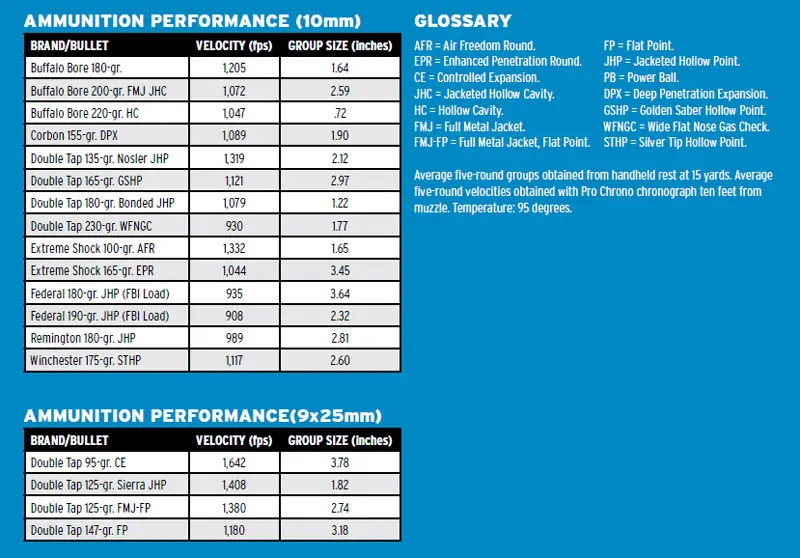
GLOCK’S GRIP
Because of excellent ergonomics, all Glocks have a good feel to them. I especially like the added grip circumference that the 10mm cartridge requires. Although the G29 SF’s trigger reach has been reduced by two millimeters, my hands are fairly large and I appreciate the way the grip’s larger circumference seems to spread perceived recoil around in a more equitable fashion rather than focus it on specific parts of the hand. This is important because in extreme loadings, both calibers can have robust recoil.
However, the larger grip can be a negative for many people. Paul Nowak from Winchester said it best: “Shooters that are happiest with the big Glocks are those that can at least palm a basketball.” Robar, through their gun frame sculpting, can change that negative into a positive for some.
DESANTIS SCABBARD
You can’t beat DeSantis holsters for quality and price. I confidently carried my issue handguns in Gene’s scabbards throughout my career as an FBI agent and so selected his Viper adjustable rake paddle holster for the project pistol.
ROBAR’S MAGIC
The Robar customized Glock is truly a thing of practical beauty, both externally and internally. In addition to the 9x25mm KKM barrel, the following upgrades were accomplished:
Frame
- Fabricate mini beavertail
- Backstrap reduction, including aggressive ¾ grip texture (sides and back)
- High grip modification
- Frontstrap reduction, including aggressive texturing frontstrap and reduction of finger grooves Round trigger guard and texture
Slide
- NP3 Plus metal finish – “Norton Special Package”
- Install semi drop-in KKM barrel and test fire
- Plate KKM barrel
- Install Warren sights
- Add forward slide serrations
Internal Work
- Glock competition trigger job. Reduce takeup and overtravel, reduce trigger reach, and smooth trigger without significantly lightening the trigger release.
GLOCK TRIGGERS.COM
Robar’s trigger work is excellent, and the Glock 29 exhibited the smoothest six-pound pull that I have ever experienced on a Glock. It was perfect for concealed carry.
However, because of the immense popularity of compact and subcompact concealment handguns, my shooting club sponsors “Belly Gun” matches with no rules as long as the gun is concealed and doesn’t print or reveal itself from any direction of observation. To keep up with these hot shots, well known for their ability to cheat, I purchased a competition trigger from Jeff Wilson of www. glocktriggers.com. The “Edge” was easy to install. All parts had a glass-like finish, and an exceptionally smooth trigger pull dropped to 3.5 pounds.
RANGE TIME
With either caliber, recoil is robust, but the pistol is comfortable to shoot and behaves well.
In spite of appreciable recoil dwell, speed shooting drills can be successfully negotiated as long as you shoot the front sight. Give the pistol a chance to reindex the target and you will have plenty of time to prep the trigger for a follow-up shot. At close combat ranges of five yards or less, you can cycle the gun at warp speed and keep a burst of rounds in the vital areas.
With its slightly thicker barrel, a Glock 29 stoked with 11 125-grain rounds tips the scales at 33 ounces. With a full cargo of 180-grain 10mm on board, carry weight will increase to almost 35 ounces.
The Glock 29/9x25mm combo left something to be desired in the accuracy department. At 45 feet, groups should have been smaller overall, but the caliber’s idiosyncratic habit of being dead on for the first round and then vertically stringing the next four rounds two to three inches north was frustrating.
A colleague suggested that the new pistol may not have been going completely into battery and might be a micro or two out. Making sure that the slide was fully seated, I shot the groups again but got similar results.
While the 9x25mm was in short supply, I had 16 different 10mm loadings to evaluate in the chopped Glock, with weights ranging from 100 to 230 grains. At .77 inch, accuracy honors went to Buffalo Bore’s 220-grain hard cast lead round. At 1,334 fps, Double Tap 135-grain JHP was the lots’ speed demon. However, this screamer failed to defeat Level II body armor, but like the lighter Dillon, it punched through aluminum vehicle armor. The recovered body armor round blossomed to .74 caliber.
Incidentally, hard cast and properly lubricated lead bullets, as opposed to lead swaged bullets, will not lead foul barrels with polygonal rifling any more than conventionally rifled barrels.
Despite its relatively heavy loadings, the Glock 29 was comfortable to shoot with one or two hands—either in slow or rapid fire—and its good manners are largely due to the dual recoil spring system that Glock has incorporated into its design. Functioning was 100%. While not the lightest compact available, this hard-hitting pistol rivals the most powerful concealable handguns on the market today.
CONCLUSIONS
This superb package of multi-caliber modifications represents only a small portion of the exclusive firearms services that Robar and others have been offering the public for many years. These services do come at a price, but serious shooters and professionals who want a virtually indestructible and aesthetically pleasing pistol consider these costs quite reasonable.
Robar takes a working gun and transforms it into a rugged presentation piece that will still serve its owner as well, if not better, in the field as did the original weapon.
Pride of ownership is an intangible, but I know that whatever I do with this pistol in the future, I will do my best to exploit its potential. The Robar-Glock demands it. I think I’ll order that .40 S&W KKM barrel now….
